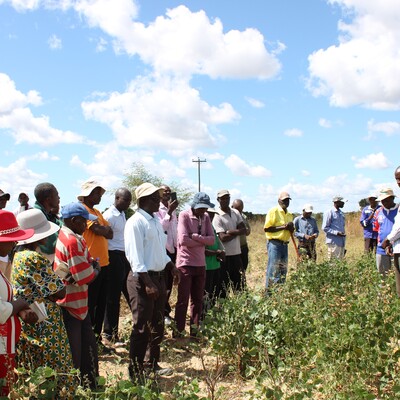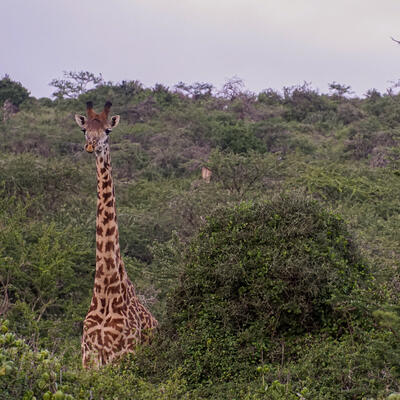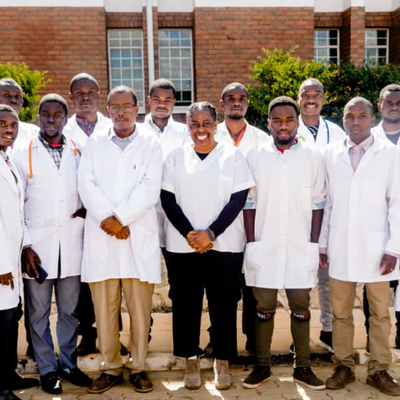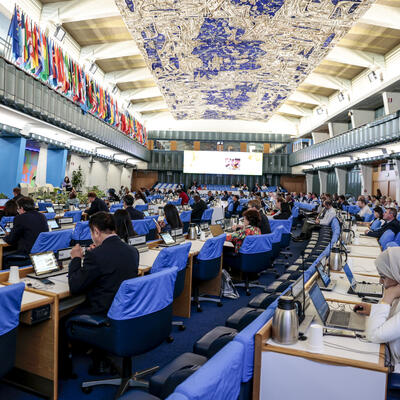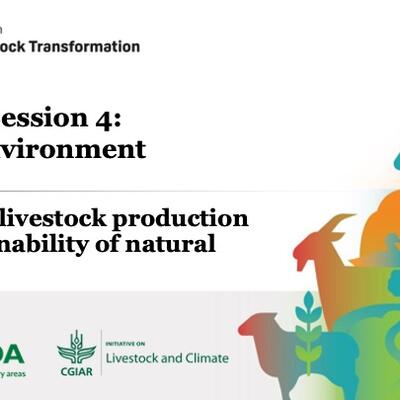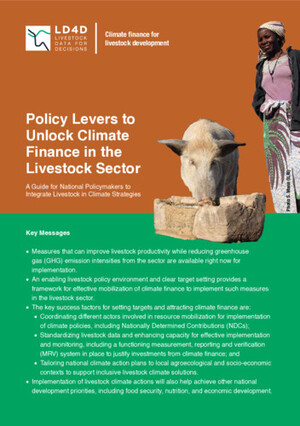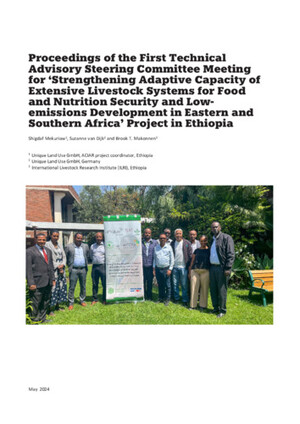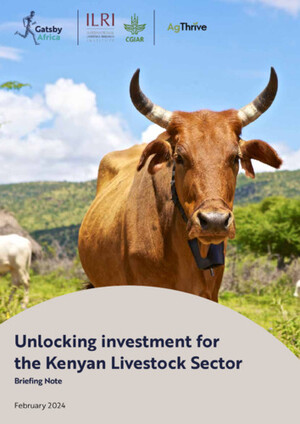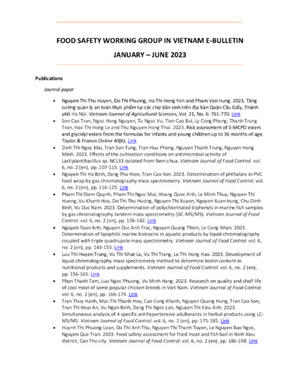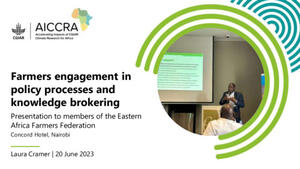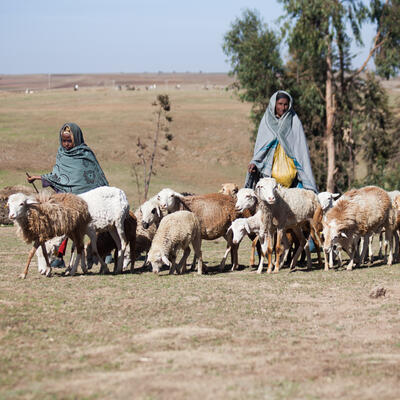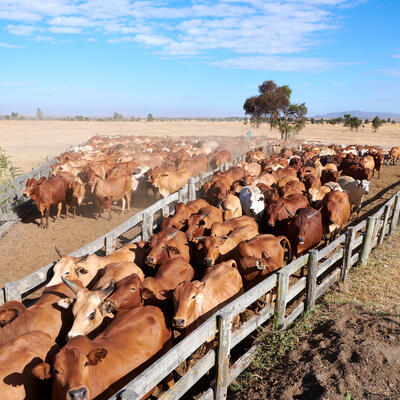
Cambodia taskforce scales up activities in line with country’s new food safety law
A taskforce of food safety experts from across Cambodia and a research project team led by the International Livestock Research Institute (ILRI) recently met in Phnom Penh to explore ways to facilitate collaboration between the authorities and researchers in Cambodia for safer food in the country. The meeting was co-hosted by the National Animal Health and Production Research Institute (NAHPRI) and ILRI as part of an ILRI-led component of the Agroecology and Safe food System Transitions, or ASSET project.
The meeting on 21 October 2022 brought together 35 experts from six governmental ministries involved in managing food safety and food quality in the country and the international organisations and donors. These included representatives from the Ministry of Agriculture, Forestry and Fishery, Ministry of Commerce, Ministry of Industry, Science, Technology and Innovation, Ministry of Health, Ministry of Tourism, Ministry of Economy and Finance, the Food and Agriculture Organization of the United Nations (FAO), the World Health Organization (WHO) and the German Agency for International Cooperation (GIZ).
 The workshop participants are representatives from six governmental ministries and international organisations and donors (photo credit: National Animal Health and Production Research Institute/Rortana Chea).
The workshop participants are representatives from six governmental ministries and international organisations and donors (photo credit: National Animal Health and Production Research Institute/Rortana Chea).The taskforce on food safety risk assessment was an initiative by the United States Agency for International Development (USAID)-funded Safe Food, Fair Food for Cambodia project (SFFF) (2017-2021). Cambodia food safety experts and researchers are members of the project-supported Technical Working Group for Food Safety that is strengthening food safety risk assessment and food safety policies in the country through joint activities with the government.
Bun Chan, deputy director of the National Animal Health and Production Research Institute (NAHPRI), on behalf of the General Directorate of Animal Health and Production (GDAHP), acknowledged the contributions of three previous meetings of the Taskforce in 2017, 2019 and 2021 to evolution of the country’s food safety policies. The previous taskforce meetings were supported by the Safe Food, Fair Food for Cambodia project. ‘This meeting is to find the best place to fit ourselves with the newly enacted food safety law,’ said Chan.
According to Dim Theng, deputy director general of the Directorate General of Consumer Protection, Competition, Fraud Repression (CCF), the new ‘Law on Food Safety’ which was promulgated in June 2022, is designed to meet the needs of international and domestic trade and protect public health. The law – consisting of 11 chapters with 43 articles – sets out the framework and mechanism for managing and ensuring the safety, quality, hygiene and legitimacy of food at all stages of the food production chain. It also provides health and food safety protection for consumers and ensures honest food trading.
At the meeting, participants learned about the current situation and challenges of food safety in Cambodia. Other key issues discussed were outbreak investigation and response from the public health sector, lessons learned from the risked-based approach and management from the SFFF Cambodia project, and experience in food safety management from its neighbouring country– Vietnam.
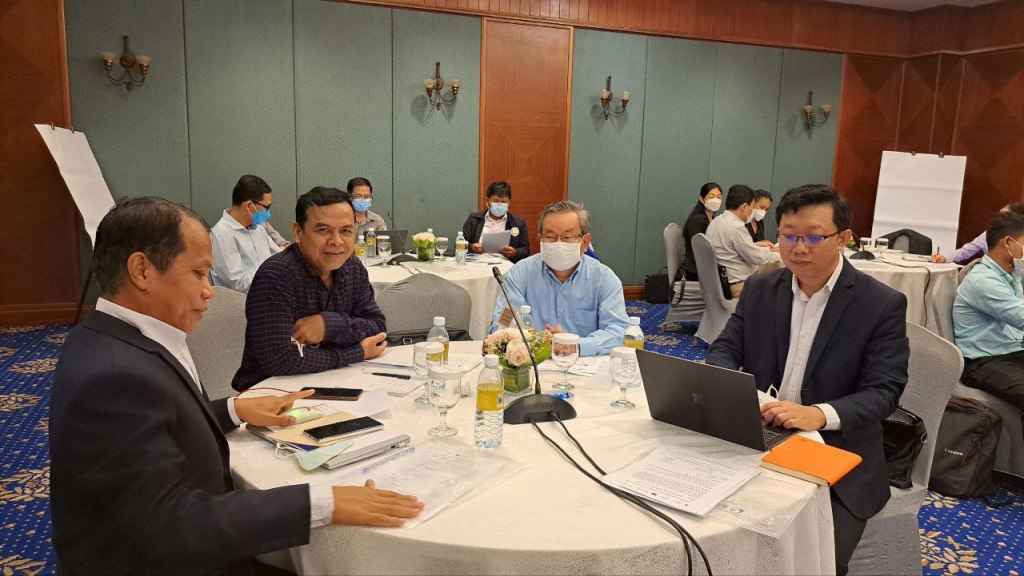 Participants discuss to strengthen the Taskforce’s role in line with the Cambodia’s new food safety law (photo credit: National Animal Health and Production Research Institute/Rortana Chea).
Participants discuss to strengthen the Taskforce’s role in line with the Cambodia’s new food safety law (photo credit: National Animal Health and Production Research Institute/Rortana Chea).Based on the SFFF Cambodia’s key findings on microbial risks linked to improper hygiene and cross-contamination, the SFFF project team tested ‘light-touch’ and low-cost interventions to improve the safety of pork and poultry sold in traditional markets across the country. Among the more hygienic practices the research team introduced were the separation of ready-to-eat from raw pork meat and intestines, frequent handwashing as well as wipe-downs of meat-selling surfaces, and promotion of clean-pork branding to retailers.
Participants at the meeting proposed strengthening the capacity for taskforce members by developing guidelines and a manual on risk-based approaches, strengthening collaboration among members through regular meetings to update on food safety in the country, and establishing a core group to facilitate the operation of the taskforce. Partners agreed to set up a communication channel for taskforce members on Telegram – a favourite social platform in Cambodia. They also suggested that the national taskforce participate in relevant national and international events and platforms such as the National Food Security Nutrition Forum and the United Nations Food Systems Summit (UNFSS).
Hung Nguyen, co-leader of the ILRI Animal Human Health Program, who also leads the CGIAR One Health Initiative emphasized the need to cement the link between the taskforce and the current multi-sectoral Technical Working Group on Food Safety so that both groups can work better together and support food safety policymakers in Cambodia.
The taskforce is currently receiving support from French Development Agency (AFD), the European Union (EU) and the French Facility for Global Environment (FFEM) through the ASSET project and the CGIAR Initiative on ‘Protecting human health through a One Health approach’, or One Health initiative.
Read related news:
Collaboration between government and researchers to improve food safety in Cambodia
‘Safe Food, Fair Food for Cambodia’—Future directions for scaling up the project’s interventions






